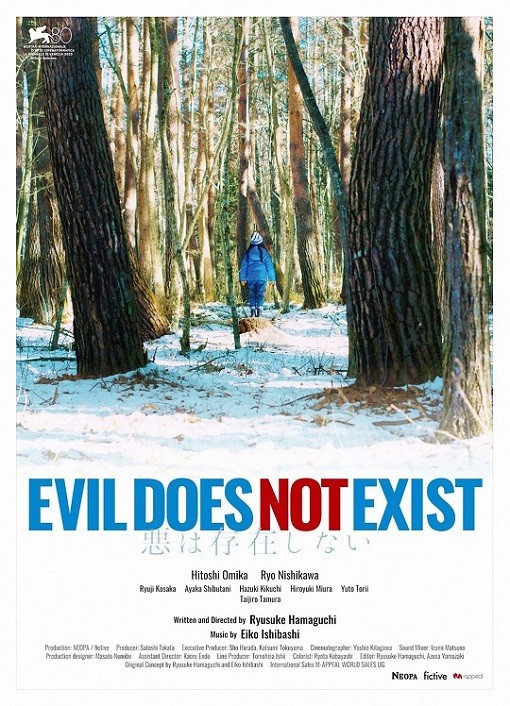Evil Does Not Exist
Introduction
Onto the next MAMI release and I have finished watching the new Japanese film, Evil Does Not Exist. Now contrasting to all the filmmakers(festival regulars) that I have been slowly discovering, Ryusuke Hamaguchi needed no introduction as far as I was concerned. It was in the year 2021 that marked my first brush with this prolific filmmaker when I watched two of his brilliant films – The Wheel Of Fortune And Fantasy and the Oscar winning film Drive My Car. These were two contrasting films, heavily focused on drama that had contrasting sentiments attached to them. While one was a tale of love and loss spread across three stories of an anthology, the other was a meditative tale on the concept of depression mixed with philosophy. And both films had such unique flavours tagged to them. So, when I did get to know about his film Evil Does Not Exist premiering at MAMI, I was quite looking forward to watching it. And I did get my opportunity thankfully! So then does Evil Does Not Exist manage to impress, let’s find out.
Story & Screenplay(Ending Explained)
I had a very different picture in mind when I heard the title ‘Evil Does Not Exist’. I was under the impression that this might be a horror film set in the woods, but boy was I wrong! That is the beauty of going into a film blind without being remotely aware of what the film stands for. So do not go by the word ‘Evil’ in the title, Evil does exist in the film but in a very different form. The story here tactfully highlights the horrors of capitalism that has been prevalent across the globe. The world is ruled by money and those who have money, also have power as a huge by-product. And capitalism is misusing the power for your own benefit, something that the film tackles really well! The screenplay standing at a shade under two hours unfolds at an unhurried pace, focusing on the world building and the characters while deftly introducing a conflict and allowing characters to react to the situation. And this for me was perhaps the most uniquely penned screenplay that I have witnessed at MAMI, my favourite yet given that it is masterful writing!
The drama opens in the woods of a small town in Japan that is home to a community that lives a peaceful life. The woods have a mysterious ambience that engulfs the drama early on, before drawing you into the film. The writers do not rush into the drama at all, slowly building the world, brick by brick and making you familiar with the characters residing in the area. Almost nothing substantial happens in the first 40 minutes while the writers give you a glimpse into the mundane lives of the characters, by taking you on a single day journey of their lives. So you are introduced to the protagonist who cuts wood for a living during the day, while also being dutied with picking up his daughter from school. There is a sense of mystery to the proceedings and that can be substantiated with the dialogue-exchange between characters of a possible ‘glamping project’ underway. And this is when the writers introduce the first conflict of capitalism.
The proceedings are engaging and engrossing with the lines etched out between the locals and a couple of companies vying the land for a tourist spot which would be on the lines of glamorous camping(hence the name ‘glamping’). The heated exchange between the concerned parties does set the ball rolling while also angering you to no extent, based on the ‘win-at-all-cost’ talks(seems familiar?). The drama also sheds light on the hierarchy of capitalism with the decisions being taken at the top, only to be implemented by the people below them, whether or whether not they agree with the decision. The conversations and situations create are simplistic but extremely layered and you need to pay attention to the most minute detail to absorb the events of the final act.
I will be explaining the ending here which seemed sudden and incomprehensible, so spoilers ahead! The drama definitely changes gears in the events leading to the final act wherein the protagonist is coaxed to be the ‘advisor’ by the members of the Talent team. Although he is not fully in agreement, he does give in, but just then his daughter goes missing. After a heavy search, the protagonist and a member of the talent team are able to locate the daughter who is surrounded by a herd of deer. There was a reference in between stating that ‘Wild Deer’ almost refrain from humans unless one of them is gun-shot. The events of the final act unfold as follows – the member of the Talent Group tries to save the daughter before being stopped by the father who could literally see his daughter collapse. So if I were to draw parallels – the gun-shot deer was the daughter, and being the parent, the character of the father had to make the talent manager unconscious, even if it was at the cost of his kin. The reason being, that the talent manager represented capitalism who was trying to secretly mix with the locals. And the moment he would try and save the daughter, he would impose a ‘favour’ which would risk the existence of his entire community. So at that point, he had to look at the larger picture and ‘eliminate’ the risk. Yes, it isn’t clear either whether the character of the daughter is dead or alive, but the community lives on to fight another day. Overall, the drama was an absolute masterclass in screenplay writing that seemed to be so simplistic on the face of it, but the moment you start digging deeper, there are rewards to be had!
Dialogues, Music & Direction
The dialogues are minimalistic but very powerful and they make for a solid impact. The BGM mostly relies on the natural sounds that adds to the eeriness of the drama while never being tonally off with the message that it was trying to convey. The cinematography captures the mood of the drama beautifully well. There is a hint of mystery represented through the foggy woods that signify a grim presence of capitalism within the community. The final shot does involve the fog mellowing down but not completely, thus capturing the future of the drama perfectly. The editing is wonderful, allowing scenes to unfold at a leisurely pace. And I could watch the protagonist chopping wood all day, something felt therapeutic. Director Ryusuke Hamaguchi does an outstanding job, allowing the drama to ‘breath’ while pacing it in a rather unhurried mode. Yet, the messaging hits home especially through the conversations that he brews along the way. The end might seem sudden and out of place but if you have been observing the drama closely, you would know the kind of genius that Ryusuke is! The direction was outstanding here.
Performances
The performances are excellent here. Ayaka Shibutani aa Mayuzumi has her moments to shine. Ryo Nishikawa as Hana has a sweet presence and she does a fine job. Ryuji Kosaka as Takahashi is wonderful and he represented the dual-faced nature of humans perfectly well. Hitoshi Omika as Takumi has a meditative and stoic presence and his understated nature works wonderfully for the film that enters the ‘unassuming’ category in its final act! He was brilliant in the film.
Conclusion
As a part of our MAMI coverage, Evil Does Not Exist showcases the horrors of capitalism exposed in a tense drama packaged as an enigmatic slow-burn! Perhaps the best film that I have watched at MAMI this year! Highly Highly Recommended!




